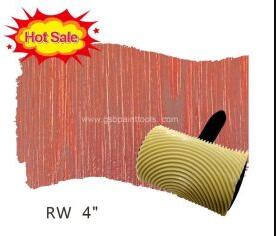Jun. 08, 2023
Tools
Introduction
Wood graining is an art form that replicates the natural beauty and texture of wood on various surfaces. In this article, we delve into the fascinating world of wood graining tools, exploring their purpose, techniques, and the transformative effect they have on interior design and woodworking projects.
Understanding Wood Graining Tools
A wood graining tool is a specialized instrument used to create realistic wood grain patterns on surfaces like walls, furniture, and trim. These tools are designed to simulate the appearance of different wood species, allowing craftsmen to achieve a genuine wood-like finish without the need for expensive materials or intricate woodworking skills.
Types of Wood Graining Tools
Rocker Graining Tool: The rocker graining tool consists of a curved metal blade with teeth or gouges. This tool is versatile and commonly used for creating long, flowing wood grain patterns. By rocking the tool back and forth along the surface, craftsmen can produce convincing wood grain effects.
Comb Graining Tool: The comb graining tool features multiple fine teeth or bristles that resemble the teeth of a comb. This tool is ideal for achieving the look of wood grain in fine lines or for adding detail to the overall pattern. Craftsmen can drag the comb tool across wet paint or glaze to create realistic wood grain effects.

Flogger Graining Tool: The flogger graining tool, also known as a stippler or stippling brush, is a brush with stiff bristles or foam pads. This tool is used to create the texture and depth found in certain wood grain patterns, such as oak or mahogany. By dabbing or stippling the tool onto the surface, craftsmen can achieve the desired effect.
Techniques and Application
Wood graining techniques involve layering different colors of paint or glaze onto the surface and manipulating them with the wood graining tool to create the illusion of wood grain. Here are the basic steps involved in wood graining:
Surface Preparation: Ensure the surface is clean, smooth, and properly primed before applying any paint or glaze. This will help achieve a more realistic and durable wood grain finish.
Base Coat: Apply a base coat of paint in the desired color, which will serve as the background color for the wood grain. Let it dry completely.
Grain Coat: Mix a glaze or a slightly darker shade of paint with a transparent glaze medium. Apply this mixture to the surface using a brush or roller, ensuring an even and thin layer.
Wood Graining: While the glaze is still wet, use the wood graining tool to create the desired wood grain pattern. Experiment with different pressures, angles, and movements to achieve realistic variations in the grain.
Finishing Touches: After completing the wood grain pattern, allow it to dry completely. If desired, apply a protective clear coat to seal and enhance the finish.
Transforming Surfaces with Wood Graining Tools
Wood graining tools for Household Wall offer endless possibilities for transforming surfaces, creating unique and visually stunning effects. With these tools, craftsmen can achieve a wide range of wood species finishes, including oak, mahogany, walnut, and more. From enhancing furniture pieces to adding warmth and character to walls, wood graining tools are a powerful asset in interior design and woodworking projects.
Conclusion
Wood graining paint tools have revolutionized the art of creating wood-like finishes on various surfaces. These specialized tools, such as rocker graining tools, comb graining tools, and flogger graining tools, enable craftsmen to replicate the beauty of natural wood without the need for expensive materials or extensive woodworking skills. By employing various techniques and manipulation with these tools, surfaces can be transformed into convincing wood grain patterns, elevating the aesthetics of any space. Whether you're a professional craftsman or a DIY enthusiast, wood graining tools provide a gateway to unleash your creativity and bring the warmth and charm of wood into your projects.
Previous: The Non-Sparking Hammer: Ensuring Safety in Hazardous Environments
Next: The Rise of Synthetic Fiber Brushes: A Revolution in Painting
If you are interested in sending in a Guest Blogger Submission,welcome to write for us!
All Comments ( 0 )